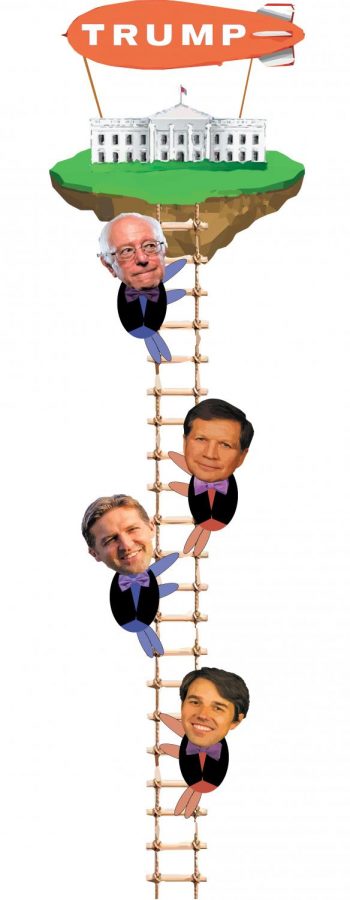Democrats Search for President Trump’s Foil
At the midterms, Democrats took back the House of Representatives with a net gain of 41 seats, but to them, the fight has only just begun. All eyes are on the 2020 general election. A majority of Americans disapprove of President Trump’s job performance: a recent Gallop poll had his disapproval rating at 60 percent. He still polls extremely well within the Republican party, and while his approval ratings are low, the Trump administration has seen these numbers before. Indeed, his approval numbers are likely to go up as he starts to seriously campaign for 2020. However, approval ratings are a serious issue, and when a true challenger starts running against Trump, they might become fatal to his presidency. However, there is still one major hurdle before that happens: who can go toe-to-toe with the President in a general election?
While President Trump won the 2016 general election for many reasons, one of the most important was the fact that his opponent was Secretary Clinton. She lacked charisma, had far too much political baggage weighing her down, and many Democrats felt that she secured the nomination by illicitly using prior connections within the party. The fact of the matter is that, had Secretary Clinton not been the nominee, the White House might look very different.
With Clinton out of the picture, the Democrats need to find someone else to lead them to victory. Joe Biden is a favorite among Democrats and Independents. He’s experienced, well-liked, and well-known. He is also known to be patriotic, a reputation the Democrats sometimes often lack, which may help him win over Independents and moderates. However, the last time he campaigned for the nomination, he lagged behind in the polls due to controversial statements and his position on the wars in Iraq and Afghanistan, forcing him to end his campaign. There is also the fact that he doesn’t resonate as well with the more progressive side of the party; he screams establishment at a time when many Democrats want the party to move in a new direction. As of now, he seems the most likely to win, but once he does start campaigning, that feeling might wash off.
Member of Congress and presumptive Speaker of the House Nancy Pelosi (D-CA) won’t run, let alone earn the nomination. She lacks charisma and, like Secretary Clinton, carries too much political baggage. Senator Elizabeth Warren (D-MA), similarly, would not win. Kamala Harris (D-CA), California’s Junior Senator, is a possibility, but should she win the nomination, her progressive policies and confrontations with the Trump administration might turn away Independents in general. Many say that the Democrats need to embrace the more progressive side of their party, but we saw in the 2018 midterms that it was the centrist and moderate Democrats who won seats, not the progressives. She may be able to appeal to a broader base on the campaign trail, but it’s hard to say.
Following the midterms, former Rep. Beto O’Rourke (D-TX) has garnered substantial national attention. He’s charismatic and an amazing campaigner, visiting every single county in Texas — all two hundred and fifty-four – during his campaign. Like Senator Harris, he’s fairly progressive, advocating for universal healthcare, the legalization of marijuana, and abolishing ICE. However, there is the obvious: he lost his election against Ted Cruz. Now, the fact that he turned Texas, of all states, purple is a monumental victory, but he will be out of office from now until the next election. That downtime could kill his campaign before it even starts, and if he wants to run for the nomination, he needs to show that he is able to contend on the federal level. Nonetheless, he actually has a chance. It’s a slim one, but many people who disagree with his policies support him, for they see him as someone who will stick to his principles and act with civility. Should he win the nomination, it could bring over many moderates who find Trump’s character and behavior distasteful.
I also feel confident adding Michael Bloomberg, Former Mayor of New York, to the list of Democratic hopefuls. He was mayor of New York City for three terms – twice as a Republican and once as an Independent – and is the fourteenth-richest person in the world. He’s a philanthropist, recently donating $1.8 billion to John Hopkins University dedicated to expanding financial aid and replacing loans with grants. The hundreds of millions of dollars on ads that he spent to help Democrats win back the House show that he could easily fund a campaign. He’s an outspoken advocate on climate change, gun control, and education, but he himself acknowledges that he is not representative of the Democratic party as a whole. He’s rather moderate as things go. Even if he could beat President Trump in the general, and that’s a big if, he wouldn’t win the Democratic nomination.
Sen. Bernie Sanders (D-VT) still has a lot of support among Democratic voters, and he polls extremely well amongst young voters. His blue-collar focus could even attract President Trump’s strongest voting bloc: white males lacking a college degree. However, he’s far too liberal to gain the support of Independents and more conservative Democrats. Maybe a bloc of voters would resign themselves to his candidacy, as many Republicans did with then-candidate Trump. There is a common saying that rings true: Democrats fall in love, Republicans fall in line. Each of the candidates above has their own passionate following. However, when push comes to shove, if voters are left with a nominee they don’t want, we could be looking at the 2016 election all over again.
The Democratic party needs a candidate who can act as a foil to the President. Someone who can inspire the Democratic base with progressive policies such as universal healthcare while also building a coalition of moderates with a pro-business platform. They need to be charismatic, energetic, and civil, and they need to prove to the country that they aren’t just another establishment hack. From everything I’ve seen, Beto O’Rourke is the best possible candidate. His character and policies guarantee strong support within the broader Democratic party, and his campaigning skills are exemplary, but he needs to work on getting moderates on his side.
In the end, I cannot definitively say who will be the face of the Democratic party leading into 2020. As we get closer and closer to the election, things will become clearer, and a front-runner may emerge. Until then, all we can do is speculate. Everyone has their favorites, and I certainly didn’t mention all possible nominees, but if no one emerges to oppose President Trump, we might be in for another six years under this administration instead of two.













